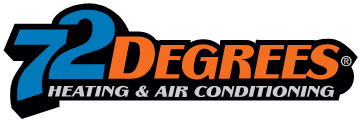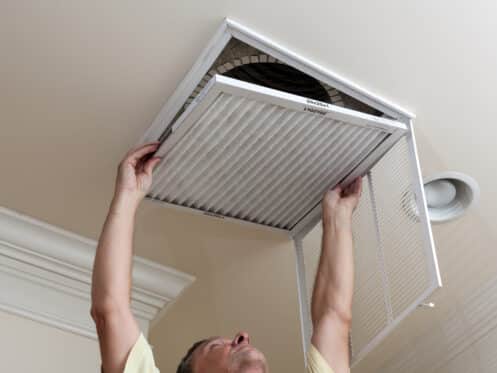The quality of the air you breathe has a significant impact on both your short- and long-term health. The EPA warns that indoor air pollution is among the leading health risks for Americans. The air inside your home can never be cleaner than the air outside without some form of air filtration. In fact, indoor air often has higher concentrations of pollutants and contaminants. Centralized heating and air conditioning is a core aspect of modern home comfort for many people. A potential downside to central HVAC is that it moves a lot of air and dust. To help protect the system itself and against diminished air quality, most central systems have a filter at the supply vent. Your choice of filter will not only affect HVAC performance and efficiency but the quality of the air you breath.
Understanding HVAC Air Filters
An important fact to understand about HVAC air filters is that their central purpose is to protect the system. The job is to keep large particulate matter out. Cleaner air is a byproduct. A cleaner system results in fresher air. All central HVAC systems are designed to operate within an optimal static air pressure range. Restricting airflow, which is what a filter does, lowers air pressure. If you choose a suboptimal filter and pressure drops too low, both efficiency and comfort will likely decrease.
Fiberglass Air Filters
Fiberglass air filters are the most basic and generally cheapest option for your HVAC system. They also provide the least airflow resistance. That doesn’t necessarily make them a superior choice. A downside to this style is a lack of surface area. That means that the filter will clog quicker. The typical rule of thumb for swapping out HVAC filters is every three months. With fiberglass filters, you may be swapping them as often as every 30 days. That may not be a negative if, for instance, you have asthma or allergies and intend to replace your filter on a frequent basis anyway. Another factor to consider is that fiberglass filters are not recyclable.
Polyester Air Filters
Polyester air filters are similar to fiberglass and other synthetic HVAC filters. The price of polyester filters is usually higher as the material costs more than fiberglass to manufacture. The advantage is that polyester is denser and thus provides more surface area. It’s filtering efficiency down to 0.5 microns in size is 95% compare to 85% with fiberglass. Below 0.5 microns, performance is similar. These filters will last longer as well, which may help offset some of the added cost. Like fiberglass filters, polyester filters are not recyclable.
Pleated Air Filters
Pleated HVAC filters strike the best balance for the average household. You’ll generally only need to swap them out every three months. Pleated filters can even last longer than that depending on resident and pet count. They also provide much greater filter efficiency for particulates all the way down to 0.3 microns. That makes them the superior choice unless you intend to swap out your filters every month. They do cost more, but if they last three months or more for you, the added expense is worth it. Some brands make their pleated filters with polyester. Most make them with paper or cotton, which are recyclable.
Charcoal Pleated Air Filters
Charcoal pleated air filters are similar to standard pleated HVAC filters. The primary difference is that pleated material is impregnated with activated charcoal. Also known as activated carbon, activated charcoal is effective for odor control. It can also absorb volatile organic compounds and other gases and chemicals from the air. Some of the charcoal filters on the market are scented. If you opt for a scented filter, choose a product that uses mineral oil, for instance, rather than a chemical scent.
Electrostatic Air Filters
The HVAC filters discussed thus far are disposable filters. When you swap them, you place them in the trash or the recycling bin. Electrostatic HVAC filters are also known as reusable or washable HVAC filters. These filters are electrically charged to attract dust, pollen and other particulates. There are pros and cons to this approach. The downsides are the that they’re more expensive and get dirtier quicker. The upside is that you can clean them with warm water and dish soap and reuse them as soon as they’re dry.
These filters will usually last between five and 10 years. That makes them the cheapest option long term. However, be mindful that you’ll generally need a pair for each supply vent during winter and summer. This way you have a filter to use while the other is drying.
MERV Rating
Minimum efficiency reporting value or MERV is an air filter rating developed by ASHRAE. The scale ranges from one to 16. Most HVAC brands recommend a MERV rating between five and eight for their systems. A MERV rating between nine and 12 is all right for most systems and will provide better filtration. At MERV 13 and above, you run the risk of decreased performance and efficiency. To confirm the acceptable MERV range for your system, check the owner’s manual, or call your HVAC technician.
Filter Thickness
Filter thickness is a factor as well. The typical system in an American home has a supply opening that is 1 or 2 inches thick. Thicknesses as high as 4 inches are not uncommon. Thicker filters do tend to have higher MERV ratings. This because they allow for greater airflow even with the greater filter effectiveness. Typically, you should purchase a filter with the exact thickness for your system and within the suitable MERV range. It is possible to use a thinner filter in a deeper frame with the use of a spacer. Most brand advise against this, and you should check with your HVAC technician before doing so.
Air Purification
HVAC air filters are an effective tool at helping avoid degradation of your indoor air quality by your central heating and cooling system. They do not provide enough filtration to reduce PM levels in a home significantly. To achieve this, you should consider a whole-home air purifier as an add-on to your HVAC system. It will have a HEPA filter that traps at least 99.97% of all PM down to 0.3 microns.
You can also opt for a unit with an activated carbon stage. This will provide a similar effect to the charcoal pleated air filters discussed earlier but on a wider scale. There are also systems with a UV-C component. That stage will eliminate or deactivate viruses, bacteria, mold spores, dust mite eggs and so forth.
Indoor Air Quality Experts in the Triangle Area
72 Degrees Heating & Air Conditioning has helped homeowners in Apex and throughout the surrounding areas improve indoor air quality since 1998. In addition to air filters, we install air purifiers, humidifiers and dehumidifiers. Our company also has NATE-certified technicians who perform a full range of HVAC services. That includes the installation, maintenance and repair of gas and electric furnaces, heat pumps, air conditioners, dual-fuel systems and mini splits. We also clean ductwork and encapsulate crawl spaces. Call us today to learn more about these services or to schedule an appointment or consultation.


